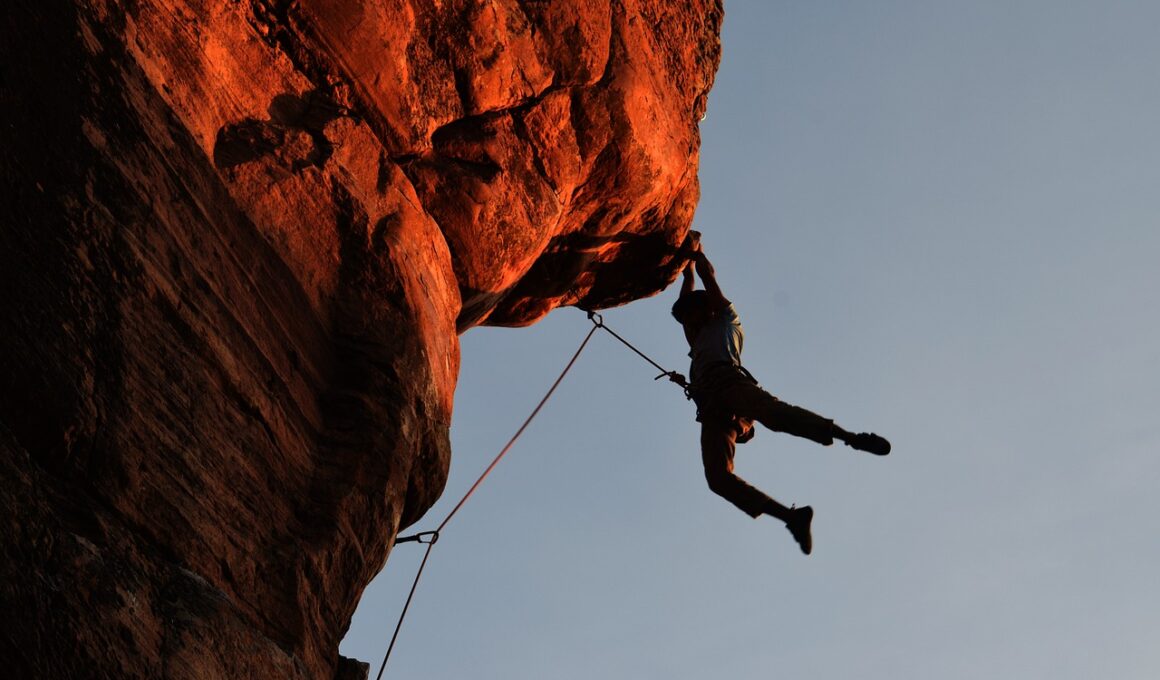Mental Preparation Techniques for Challenging Bouldering Problems
Approaching challenging bouldering problems requires the right mindset and mental preparation techniques. Mental fortitude can significantly enhance performance, especially when faced with tough routes. One effective technique is visualization, which involves imagining yourself completing the route successfully. Visualize each move clearly, from start to finish, and picture yourself executing it flawlessly. By rehearsing the climb mentally, climbers can build confidence and reduce anxiety. Another method is positive self-talk, where you reinforce your abilities with affirming statements. Remind yourself of past successes in similar challenges, as this boosts determination. Combine these techniques with meditation or mindfulness practices to create a balanced mental state. Practicing mindfulness helps climbers focus fully on the present, free from distractions or doubts. Breaking down a problem into manageable sections also assists in mental preparation. Analyze each hold and movement, such as breakpoints, to create an approach plan. This systematic strategy can reduce overwhelm and improve clarity. Lastly, ensure you’re well-rested and aware of your physical condition. Mental readiness is deeply intertwined with physical well-being, and maintaining both will help you tackle bouldering challenges more effectively.
Developing resilience is essential in bouldering performance and tackling challenging problems. Resilience helps climbers bounce back from setbacks and persist through difficulties. Try shifting your perspective towards challenges as opportunities for growth rather than obstacles. Adopting a growth mindset is crucial for developing resilience; focus on what can be learned rather than emphasizing failure. Journaling can also be an effective tool for managing emotions and thoughts related to bouldering experiences. Documenting your climbs allows for reflection, letting you understand and learn from each attempt. Another useful strategy involves setting manageable goals, which can strengthen resilience over time. Initially, set small, achievable targets that lead to larger objectives. Celebrate these milestones, even if they are minor victories, reinforcing motivation and commitment. Additionally, engage in supportive social environments where fellow climbers share their challenges. Connecting with others fosters community and provides valuable insights into coping strategies. Regular practice reinforces the mental techniques, making them more effective over time. Embrace the process of learning and recognize that challenges are integral to becoming a better climber. As you build resilience, you will enhance your capacity to face difficult climbs with determined confidence.
Managing Expectations
Managing expectations is an important aspect of mental preparation for bouldering. Setting realistic goals helps maintain motivation without overwhelming yourself. Instead of pressuring yourself to conquer difficult routes immediately, understand that progress takes time and dedication. Recognize that every climber faces challenges unique to their skill and experience levels. Commitment to your climbing journey is crucial, but balance these ambitions with patience. Moreover, be prepared for the possibility of failure in difficult climbing attempts. Instead of viewing failures as setbacks, acknowledge their role in the learning process. Analyzing what went wrong can lead to informed adjustments in technique and mindset. Focus on the journey instead of fixating solely on outcomes. This shift in focus enables climbers to appreciate each climbing experience and its lessons. Evaluation of performance can be constructive; for this, keep an open dialogue with climbing partners or coaches. Seeking feedback on technique often provides insights that enhance growth. Track your progress objectively, noting not just successes but all endeavors. When you view bouldering problems as opportunities for learning rather than mere tests of ability, it helps reduce pressure and nervousness.
Emotional regulation is essential in enhancing focus and performance when facing tough bouldering challenges. An effective practice involves deep breathing techniques, which help calm nerves before and during climbs. Engaging in slow, deliberate inhalations and exhalations allows for better concentration and relaxation. Implementing a pre-climb routine that incorporates breathing exercises establishes a mental structure to follow consistently. Building this routine creates a sense of familiarity, reducing anxiety. Visualization of a successful climb can accompany deep breaths, creating a powerful combined effect of mental clarity and calmness. Another strategy is to embrace mindfulness throughout the climbing experience. Focus on your body and movements instead of tying emotional responses to outcomes. Acknowledge feelings of frustration or fear, but gently redirect your attention to the process of climbing. Journaling feelings and experiences can also help regulate emotions effectively. Understanding your response patterns provides insights into what triggers stress, enabling you to counter those feelings proactively. By developing emotional resilience alongside strategies for monitoring and regulating emotional responses, climbers can foster greater positivity and focus. Maintaining a balanced emotional state encourages a higher level of performance, helping you thrive in challenging situations.
The Role of Rest and Recovery
Another crucial aspect of mental preparation is recognizing the importance of rest and recovery in between climbing sessions. Quality recovery allows both the body and mind to recharge, essential for tackling challenging bouldering routes effectively. Ensure you’re prioritizing rest days and allowing adequate recovery post-climb to prevent burnout. During rest periods, engage in activities that relax your mind, such as meditation or gentle yoga. These practices create a harmonious balance between mental exertion and recovery, allowing you to return to climbing equipped with renewed energy. Hydration and nutrition also play significant roles in recovery. Maintaining a well-balanced diet fuels both your physical and mental processes, optimizing peak performance. Evaluate your post-climbing recovery regimen critically; simple practices such as foam rolling or stretching can alleviate muscle tension, contributing to overall well-being. Additionally, delve into the mental aspect of recovery by reflecting on your climbs during downtime. Analyzing performance while in a relaxed state empowers you to identify areas for improvement. This reflective practice cultivates a deeper understanding of your climbing approach, preparing you mentally for future challenges while maintaining a healthy perspective throughout the learning process.
Regularly practicing mental strategies reinforces a climber’s ability to approach challenges more effectively. Allocate time in each training session specifically for mental preparation techniques. This ensures mental practices become ingrained within your climbing routine and strengthen automatically over time. Consider working with a professional sports psychologist, as they can provide targeted strategies for enhancing your mental preparation for bouldering. Personalized plans grasp specific issues you might face, such as performance anxiety or difficulty maintaining focus. Such professional help can encourage better coping mechanisms and provide a framework for success. Coupling mental strategies with physical training also enhances overall performance. Engaging in climbing drills while concentrating on mental aspects reinforces the connection between body and mind during climbs. Watching instructional climbing videos can offer valuable insights as you prepare mentally for difficult routes. Analyze how advanced climbers approach similar problems; this might inspire new strategies for yourself. Engage in self-assessment through video reflection after climbing sessions. Regularly observing your technique foster a critical mind that constantly seeks improvement. By delving into both physical and mental facets of climbing, you will promote holistic growth in your bouldering prowess.
Conclusion: Embracing the Journey
In summary, mental preparation techniques are vital for overcoming challenging bouldering problems, intertwining cognitive and physical endurance aspects. Embrace the mixture of visualization, positive self-talk, and mindfulness to establish a robust mental foundation. Moreover, fostering resilience and managing expectations are instrumental in shaping a climber’s experience. Distinguishing emotional responses and employing regulation methods enhances focus during climbs. Rest and recovery also play critical roles, allowing for optimal brain performance during challenging endeavors. Regular practice reinforces these techniques, ultimately contributing to mastering climbing challenges effectively. Seek professional guidance if needed, as external assistance can provide fresh perspectives and tailored strategies. Value the journey over immediate outcomes, as growth manifests through experience, both in and out of climbing. Celebrate the progress you make along the way, reinforcing dedication and purpose. Whether through confronting fear, overcoming frustration, or achieving personal bests, recognize the benefits of mental preparation as integral to bouldering success. Ultimately, this allows you to enjoy the outdoor adventure of climbing while developing skills that will aid not only in bouldering but across life’s challenges.
As you integrate these techniques into your routine, you will find that overcoming daunting challenges becomes increasingly feasible. Bouldering is not merely a physical pursuit; it represents a pathway of personal growth and self-discovery. With dedication, you can cultivate your ability to approach climbs with confidence and focus, ready to embrace the unique challenges each bouldering route presents. Mindfully training both body and mind fosters a harmonious relationship, enhancing not only your climbing skills but your overall perspective on facing life’s challenges. Investing time in mental preparation yields dividends both on and off the climbing wall, filling your experiences with fulfillment and joy. And when faced with setbacks, remember they are merely stepping stones that shape your climbing journey further. Resilience generated within the sport will reflect positively in daily life. As each climb brings new insights into your abilities, you will meet challenges with enthusiasm rather than fear once you embrace the journey. Cultivate a mindset of learning and growth to not only improve your bouldering abilities but to carry this forward through the various journeys that lie ahead.


